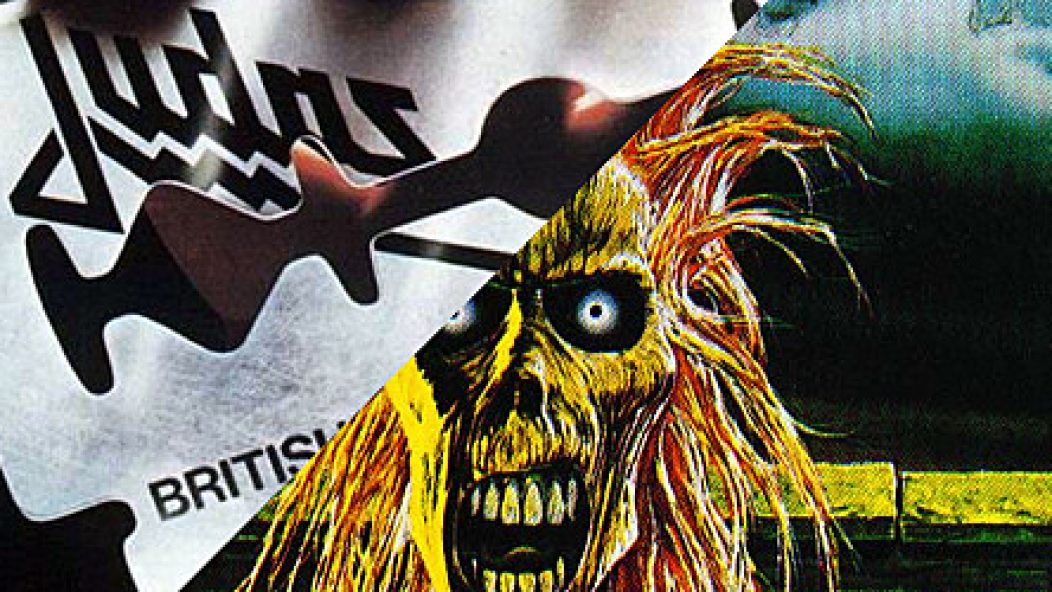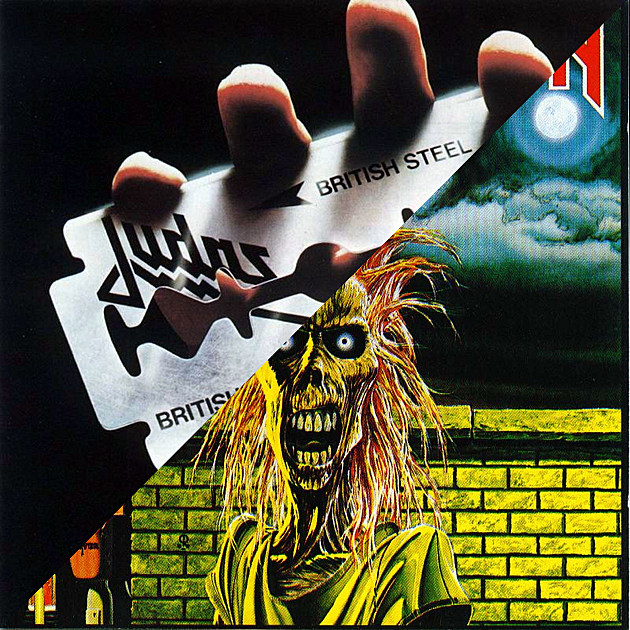
British Steel & Iron Maiden: 35 Years Later
…
In thinking about legendary metal albums, there are enough Top Ten lists and “definitive” rankings floating around that printing them all would deforest more acres than Ronald McDonald. While subgenres and trends are fleeting, power and craft are forever; how else to explain three generations of Black Sabbath, Judas Priest, Iron Maiden and Motörhead fans? Cynics may point to the classics and dismiss their enduring popularity as simply looking back through rose-tinted shades, that the passage of time has turned them into sacred cows beyond reproach. That point of view does hold weight, especially after the last time I listened to Sacred Reich. But sometimes a great album is just a great fucking album, and two of the greatest were released on the same day in April of 1980: Judas Priest’s British Steel and Iron Maiden’s self-titled debut.
Priest was the established big metal brother to Maiden’s snotty punk kid. They had a major label deal with CBS Records and their profile was on the rise. Stained Class and Killing Machine (Hell Bent For Leather in the States) saw the heavy metal tropes emerge: dark lyrics, heavier riffs, leather ‘n’ studs stage outfits. Yet the songs – “Exciter,” “Saints In Hell,” “Hell Bent For Leather” – had a more polished sound and overall commercial appeal.
On British Steel, Priest struck the perfect balance between metal and mainstream. The songs were heavy and aggressive, more so than anything before them, yet you could still sing along to the choruses. The overt influences of Sabbath, Zeppelin and Deep Purple had been drowned out by a sound that never existed before. “Breaking The Law” and THAT RIFF: it defined metal to most music fans for years. While the genre has a well-deserved reputation for technical prowess and complexity, British Steel is simple and streamlined, concentrating on hooks above all. From that standpoint there is a direct line from this album to Slayer and Reign In Blood, which also happens to be the next genre-defining point in heavy metal history. Both albums clock in at less than forty minutes, contain perennial fan favorites and broke both bands open to success. It’s no surprise that British Steel was also the album that finally connected Priest to the commercially critical American market.
British Steel’s influence has permeated the musical and cultural landscape for decades. From “Beavis & Butthead” and “The Simpsons” parodying “Breaking The Law” to Down covering “Grinder” in concert to “Living After Midnight” forever cemented in FM rock radio rotation, Judas Priest’s breakthrough continues to directly (and indirectly) inspire. That’s not to detract from their earlier albums, all classics in their own right, which must have been in the wheelhouse of a young Iron Maiden. Steve Harris & Co. had the same influences as Priest, albeit with a bigger debt owed to Wishbone Ash and Thin Lizzy. The first several years of the band were full of constant member turnover and even a few breakups, until the arrival of Paul Di’Anno and the legendary Soundhouse Tapes demo. With a solid lineup and new record deal, Maiden was ready to make an impact.
Iron Maiden is easily one of the best metal debuts of all time, and 35 years has not diminished its energy, sense of urgency or display of raw talent. It doesn’t have the production value of Killers or bombastic appeal of the Bruce Dickinson era but it doesn’t need any of that. Harris’ songwriting and lyrical skills were apparent from the start; “Prowler” and its profile of a creepy stalker, retelling the classic “Phantom Of The Opera,” the simple punk rock medieval torture of “Iron Maiden.” While guitarist Dave Murray would later make twin guitar harmony history with Adrian Smith, Dennis Stratton did a decent job keeping up and helped lay the groundwork for everyone that followed: Metallica, Anthrax, Opeth, Dream Theater and, uh, Avenged Sevenfold. Iron Maiden had a more immediate impact too, as it was more or less the genesis for the New Wave Of British Heavy Metal. Saxon, Def Leppard, Tygers Of Pan Tang and Diamond Head all found varying levels of success in the wake of Maiden’s arrival by following the denim-dual guitar-high energy formula. The album’s positive reception in Britain quickly translated to a popular following in mainland Europe and a world tour the following year, with their first-ever U.S. show opening for…Judas Priest. Perhaps the best indicator of these albums’ success is how much I enjoyed listening to both of them, for the umpteenth time, to write this.
…
Judas Priest – British Steel
…
Iron Maiden – Iron Maiden
…












